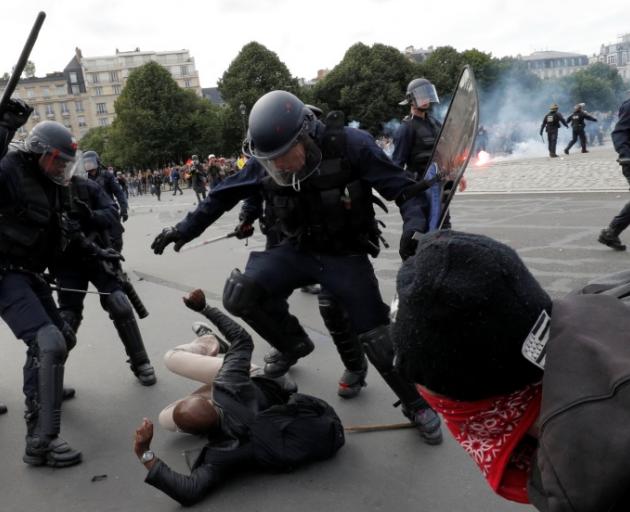
Gangs of masked youths have smashed windows and hurled stones at riot police as thousands of people marched through Paris in protest at a planned change of labour laws that would make hiring and firing easier.
Police fired dozens of volleys of teargas and used water cannon to disperse highly mobile groups of mostly black-clad youths on Tuesday. The police department reported 20 police and six protesters were injured and 21 arrests made in a street march led by labour unions.
The scuffles came at a time when police are stretched to ensure security during the month-long Euro football tournament, with France on maximum alert since Islamist militants killed 130 people in November last year.
The hardline CGT labour union had called for a big turnout to prove opposition to the labour reform is still strong despite waning turnout at rallies and strikes.
But estimates varied widely. The Force Ouvriere union, which is allied with the CGT, put it at 1 million people in Paris, while police said between 75,000 and 80,000 people took part in marches in the capital.
The CGT itself said about 1.3 million people took part across France, more than the 1.2 million reached during a previous peak on March 31, when police had seen 400,000 protesters.
"This is not the end," CGT leader Philippe Martinez said. "The struggle is far from over."
The CGT, backed by smaller unions in a campaign of strikes and protests, is sparring for pole position with another big union, the CFDT, which backs the reform that would also devolve setting of pay and working conditions more extensively to company level.
In tandem with Tuesday's protest, workers stopped work at the state-owned SNCF rail company, which nevertheless said disruption was far less than at the outset of a rolling strike two weeks ago or on previous occasions this year.
Ninety percent of high-speed connections were operating and other services were working at about 70%, the SNCF said.
The CGT and the smaller Force Ouvriere say the reform will undermine standards of labour protection.
The government, and the large CFDT union argue the contrary, saying it will help tackle a jobless rate of 10% and also develop labour representation at grassroots level.
President Francois Hollande's Socialist government has insisted it would not withdraw the reform, which has already been watered down. It forced it through the lower house of parliament by decree last month and aims to make it law by July.












